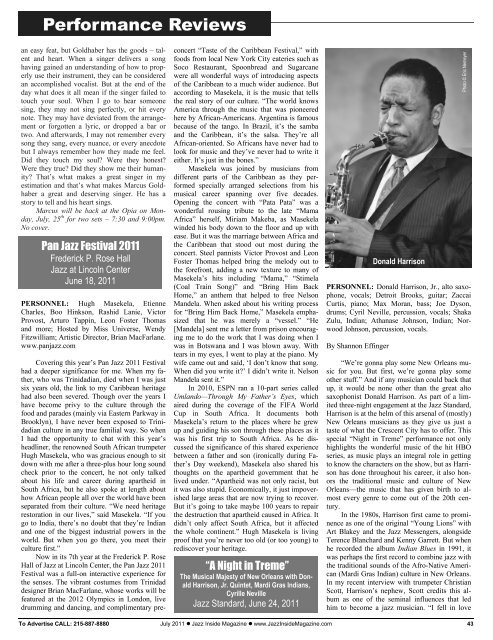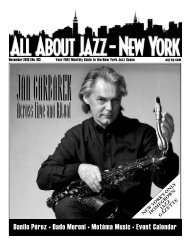Piano Lovers' Celebration Interviews SUMMER ... - Jazz Singers.com
Piano Lovers' Celebration Interviews SUMMER ... - Jazz Singers.com
Piano Lovers' Celebration Interviews SUMMER ... - Jazz Singers.com
You also want an ePaper? Increase the reach of your titles
YUMPU automatically turns print PDFs into web optimized ePapers that Google loves.
Performance Reviews<br />
an easy feat, but Goldhaber has the goods – talent<br />
and heart. When a singer delivers a song<br />
having gained an understanding of how to properly<br />
use their instrument, they can be considered<br />
an ac<strong>com</strong>plished vocalist. But at the end of the<br />
day what does it all mean if the singer failed to<br />
touch your soul. When I go to hear someone<br />
sing, they may not sing perfectly, or hit every<br />
note. They may have deviated from the arrangement<br />
or forgotten a lyric, or dropped a bar or<br />
two. And afterwards, I may not remember every<br />
song they sang, every nuance, or every anecdote<br />
but I always remember how they made me feel.<br />
Did they touch my soul? Were they honest?<br />
Were they true? Did they show me their humanity?<br />
That’s what makes a great singer in my<br />
estimation and that’s what makes Marcus Goldhaber<br />
a great and deserving singer. He has a<br />
story to tell and his heart sings.<br />
Marcus will be back at the Opia on Monday,<br />
July, 25 th for two sets – 7:30 and 9:00pm.<br />
No cover.<br />
Pan <strong>Jazz</strong> Festival 2011<br />
Frederick P. Rose Hall<br />
<strong>Jazz</strong> at Lincoln Center<br />
June 18, 2011<br />
PERSONNEL: Hugh Masekela, Etienne<br />
Charles, Boo Hinkson, Rashid Lanie, Victor<br />
Provost, Arturo Tappin, Leon Foster Thomas<br />
and more; Hosted by Miss Universe, Wendy<br />
Fitzwilliam; Artistic Director, Brian MacFarlane.<br />
www.panjazz.<strong>com</strong><br />
Covering this year’s Pan <strong>Jazz</strong> 2011 Festival<br />
had a deeper significance for me. When my father,<br />
who was Trinidadian, died when I was just<br />
six years old, the link to my Caribbean heritage<br />
had also been severed. Though over the years I<br />
have be<strong>com</strong>e privy to the culture through the<br />
food and parades (mainly via Eastern Parkway in<br />
Brooklyn), I have never been exposed to Trinidadian<br />
culture in any true familial way. So when<br />
I had the opportunity to chat with this year’s<br />
headliner, the renowned South African trumpeter<br />
Hugh Masekela, who was gracious enough to sit<br />
down with me after a three-plus hour long sound<br />
check prior to the concert, he not only talked<br />
about his life and career during apartheid in<br />
South Africa, but he also spoke at length about<br />
how African people all over the world have been<br />
separated from their culture. “We need heritage<br />
restoration in our lives,” said Masekela. “If you<br />
go to India, there’s no doubt that they’re Indian<br />
and one of the biggest industrial powers in the<br />
world. But when you go there, you meet their<br />
culture first.”<br />
Now in its 7th year at the Frederick P. Rose<br />
Hall of <strong>Jazz</strong> at Lincoln Center, the Pan <strong>Jazz</strong> 2011<br />
Festival was a full-on interactive experience for<br />
the senses. The vibrant costumes from Trinidad<br />
designer Brian MacFarlane, whose works will be<br />
featured at the 2012 Olympics in London, live<br />
drumming and dancing, and <strong>com</strong>plimentary pre-<br />
concert “Taste of the Caribbean Festival,” with<br />
foods from local New York City eateries such as<br />
Soco Restaurant, Spoonbread and Sugarcane<br />
were all wonderful ways of introducing aspects<br />
of the Caribbean to a much wider audience. But<br />
according to Masekela, it is the music that tells<br />
the real story of our culture. “The world knows<br />
America through the music that was pioneered<br />
here by African-Americans. Argentina is famous<br />
because of the tango. In Brazil, it’s the samba<br />
and the Caribbean, it’s the salsa. They’re all<br />
African-oriented. So Africans have never had to<br />
look for music and they’ve never had to write it<br />
either. It’s just in the bones.”<br />
Masekela was joined by musicians from<br />
different parts of the Caribbean as they performed<br />
specially arranged selections from his<br />
musical career spanning over five decades.<br />
Opening the concert with “Pata Pata” was a<br />
wonderful rousing tribute to the late “Mama<br />
Africa” herself, Miriam Makeba, as Masekela<br />
winded his body down to the floor and up with<br />
ease. But it was the marriage between Africa and<br />
the Caribbean that stood out most during the<br />
concert. Steel pannists Victor Provost and Leon<br />
Foster Thomas helped bring the melody out to<br />
the forefront, adding a new texture to many of<br />
Masekela’s hits including “Mama,” “Stimela<br />
(Coal Train Song)” and “Bring Him Back<br />
Home,” an anthem that helped to free Nelson<br />
Mandela. When asked about his writing process<br />
for “Bring Him Back Home,” Masekela emphasized<br />
that he was merely a “vessel.” “He<br />
[Mandela] sent me a letter from prison encouraging<br />
me to do the work that I was doing when I<br />
was in Botswana and I was blown away. With<br />
tears in my eyes, I went to play at the piano. My<br />
wife came out and said, ‘I don’t know that song.<br />
When did you write it?’ I didn’t write it. Nelson<br />
Mandela sent it.”<br />
In 2010, ESPN ran a 10-part series called<br />
Umlando—Through My Father’s Eyes, which<br />
aired during the coverage of the FIFA World<br />
Cup in South Africa. It documents both<br />
Masekela’s return to the places where he grew<br />
up and guiding his son through these places as it<br />
was his first trip to South Africa. As he discussed<br />
the significance of this shared experience<br />
between a father and son (ironically during Father’s<br />
Day weekend), Masekela also shared his<br />
thoughts on the apartheid government that he<br />
lived under. “Apartheid was not only racist, but<br />
it was also stupid. Economically, it just impoverished<br />
large areas that are now trying to recover.<br />
But it’s going to take maybe 100 years to repair<br />
the destruction that apartheid caused in Africa. It<br />
didn’t only affect South Africa, but it affected<br />
the whole continent.” Hugh Masekela is living<br />
proof that you’re never too old (or too young) to<br />
rediscover your heritage.<br />
“A Night in Treme”<br />
The Musical Majesty of New Orleans with Donald<br />
Harrison, Jr. Quintet, Mardi Gras Indians,<br />
Cyrille Neville<br />
<strong>Jazz</strong> Standard, June 24, 2011<br />
PERSONNEL: Donald Harrison, Jr., alto saxophone,<br />
vocals; Detroit Brooks, guitar; Zaccai<br />
Curtis, piano; Max Moran, bass; Joe Dyson,<br />
drums; Cyril Neville, percussion, vocals; Shaka<br />
Zulu, Indian; Athanase Johnson, Indian; Norwood<br />
Johnson, percussion, vocals.<br />
By Shannon Effinger<br />
Donald Harrison<br />
“We’re gonna play some New Orleans music<br />
for you. But first, we’re gonna play some<br />
other stuff.” And if any musician could back that<br />
up, it would be none other than the great alto<br />
saxophonist Donald Harrison. As part of a limited<br />
three-night engagement at the <strong>Jazz</strong> Standard,<br />
Harrison is at the helm of this arsenal of (mostly)<br />
New Orleans musicians as they give us just a<br />
taste of what the Crescent City has to offer. This<br />
special “Night in Treme” performance not only<br />
highlights the wonderful music of the hit HBO<br />
series, as music plays an integral role in getting<br />
to know the characters on the show, but as Harrison<br />
has done throughout his career, it also honors<br />
the traditional music and culture of New<br />
Orleans—the music that has given birth to almost<br />
every genre to <strong>com</strong>e out of the 20th century.<br />
In the 1980s, Harrison first came to prominence<br />
as one of the original “Young Lions” with<br />
Art Blakey and the <strong>Jazz</strong> Messengers, alongside<br />
Terence Blanchard and Kenny Garrett. But when<br />
he recorded the album Indian Blues in 1991, it<br />
was perhaps the first record to <strong>com</strong>bine jazz with<br />
the traditional sounds of the Afro-Native American<br />
(Mardi Gras Indian) culture in New Orleans.<br />
In my recent interview with trumpeter Christian<br />
Scott, Harrison’s nephew, Scott credits this album<br />
as one of the seminal influences that led<br />
him to be<strong>com</strong>e a jazz musician. “I fell in love<br />
To Advertise CALL: 215-887-8880 July 2011 � <strong>Jazz</strong> Inside Magazine � www.<strong>Jazz</strong>InsideMagazine.<strong>com</strong><br />
43<br />
Photo © Eric Nemeyer




